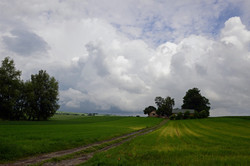
A farm in the south-eastern Polish village of Zurawlow (Photo: Janek Skarzynski/AFP via Getty Images)
Poland raises fences to block farmland sales
By Jan Cienski
WARSAW — A new Polish law restricting ownership rights for farmland is raising protests from legal watchdogs and some farmers, and the European Commission plans to take a close look whether it violates EU rules.
The law goes into effect April 30, and was passed in order to prevent foreigners from easily buying Polish land. When Poland joined the EU on May 1, 2004, it received a 12-year opt-out preventing non-Poles from buying rural land, as the government was worried that richer Western Europeans, and in particular Germans, would swoop in to buy vast amounts on farmland.
That’s still the worry today.
“Land is a national good, and it should be in family farms, for the most part cultivated or managed by Poles and Polish farmers,” Krzysztof Jurgiel, the agriculture minister, said in a recent radio interview.
The problem for Warsaw is that EU rules forbid national discrimination. That forces the new law to include tough restrictions on land sales and ownership, which make it difficult for most Poles, as well as foreigners, to buy farmland.
The only owners not bound by the new restrictions are the state and religious institutions.
The new law halts land sales from the government’s landowning agency for five years, and also imposes restrictions on the sale of private land. As of next week, only people formally qualified to be farmers can buy land. The law requires that they have lived in a given locality for five years, and pledge to personally work the land they buy for a decade. Farm sizes are limited to 300 hectares.
The government land agency can scrutinize sales, and can step in to buy land at its own determined price.
The only owners not bound by the new restrictions are the state and religious institutions. Poland’s right-wing government felt that churches, and especially the powerful Roman Catholic Church, are due compensation for losses suffered during 45 years of communism.
The government points out that restricting ownership rights for farmland is common practice across much of the EU.
“The goal of the law is to keep the current structure of Polish farming, with mainly fairly small family farms,” said Piotr Semeniuk, an analyst with Polityka Insight, a think tank.
Worries over joining EU
Despite the opt-out negotiated when Poland joined the EU, Polish farmland has been a solid investment, drawing in both farmers and land speculators. A hectare cost on average about 6,634 złotys in 2004 (about €1,543 at today’s exchange rate), and now costs almost 40,000 złotys, according to Poland’s statistical agency.
Although foreigners were formally not allowed to buy land, they could do so with permission from the interior ministry, which wasn’t difficult to obtain. It was also possible for foreigners to buy through local partners, or by setting up Polish companies. Lawyers say the new law ends most of those work-arounds.
Some companies, as well as successful local farmers, have built large holdings that have turned into big businesses. As a result, Poland has become one of the EU’s leading food exporters, earning €26.3 billion last year, a 7.7 percent increase over 2014 and five times more than in 2014.
But while a tiny number of entrepreneurial farmers have grown rich, most Polish farms are still small and poor — with an average size of only 10.5 hectares. That creates a powerful advocacy group of smallholders worried about larger agribusinesses.












